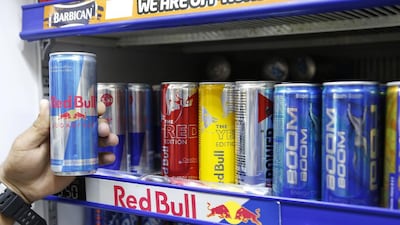The UAE has published the law on excise taxes for tobacco and energy and fizzy drinks that will pave the way for introducing the levies in the fourth quarter of this year.
The UAE plans to introduce excise rates at a rate of 100 per cent on tobacco and energy drinks and 50 per cent on fizzy drinks.
This means a Dh1.50 can of convenience store soft drink will cost Dh2.25. But smokers and regular energy drink guzzlers are the ones who will really feel their pennies pinched.
A 355ml Monster energy drink will cost consumers Dh12, instead of Dh6, and a 20-pack of Marlboro will cost Dh22 instead of Dh11.
“The project diversifies the Government’s revenue streams and boosts its resources, which, in turn, will strengthen the economy and ensure its sustainability," said Sheikh Hamdan bin Rashid Al Maktoum, Deputy Ruler of Dubai, UAE Minister of Finance, and Chairman of the Federal Tax Authority, in a statement on news agency Wam.
___________________
Read our essential tax guide here: Tax in the UAE: Everything you need to know about VAT and a little bit more
___________________
"The Excise Tax, in particular, will help us build a healthier and safer society. This tax is set to discourage the consumption of products that negatively impact the environment and, more importantly, people’s health, while the revenues it generates will go towards supporting advanced services for all members of society."
It is the latest battle line drawn in the effort to curb on childhood obesity in a nation where 19 per cent of the population is diabetic. By making sugar loaded fizzy drinks more expensive, the Government hopes it will help reduce diabetes rates to 16 per cent by 2021.
"From a medical perspective we need to be looking at ways to reduce the consumption of sugary drinks and junk food, and taxation is one way of doing that," said Dr Walid Shaker, consultant cardiac surgeon at Burjeel Hospital, Abu Dhabi told The National in May.
___________________
BY THE NUMBERS:
We visited a convenience store to compare just how much prices for different products will increase.
Coke/ Fanta/ Sprite/ Pepsi varieties 355ml: will increase from Dh1.50 to Dh2.25
Coke/ Fanta/ Sprite/ Pepsi varieties 500ml: Dh2.50 to Dh3.75
Vimto 250ml: Dh1.50 to Dh2.25
Epic 250ml energy drink: Dh2.50 to Dh5
Pokka Power Up 325ml: Dh3.20 to Dh6.40
Red Bull 355ml energy drink: Dh9 to Dh18
Red Bull 250ml: Dh5.50 to Dh11
Red Bull 250ml sugar-free and other varieties: Dh6 to Dh12
Monster 355ml energy drink: Dh6 to Dh12
Marlboro Gold 20-pack of cigarettes: Dh11 to Dh22
Dunhill 20-pack: Dh11 to Dh22
Parliament 20-pack: Dh13 to Dh26
Bon or Three Stars 20-pack: Dh2 to Dh4
___________________
“It will help reduce calorie intake by encouraging young people to make cheaper, alternative choices as we know there is a problem with obesity, hypertension and diabetes in the UAE. It is a major problem here.”
The UAE is expected to be the second country to introduce excise taxes after Saudi Arabia began taxing at the same rate in June this year.
The law is expected to be followed by the publication of the value-added tax (VAT), which will be implemented at a GCC-wide rate of 5 per cent starting January 1, 2018.
The introduction of VAT and excise taxes are expected to boost the inflation rate by a one-off 1.4 per cent, Khalid Al Bustani, the director general of the country’s Federal Tax Authority said earlier this month.
Around 250 companies will be subject to the excise tax, he added.
The UAE and other GCC states are introducing taxes to make up for dwindling income from energy caused by the slide in oil prices since mid-2014.
___________________
Read more:
UAE tax laws by September, may increase consumer prices by 1.4%
VAT is coming to the UAE, time to study up
Sheikh Khalifa issues landmark tax law for UAE
___________________

